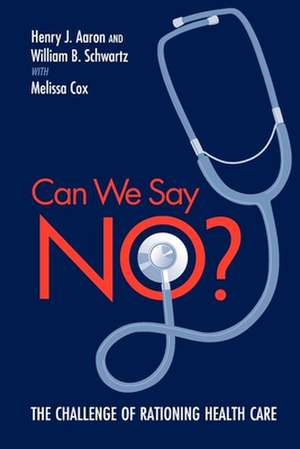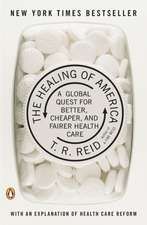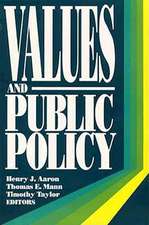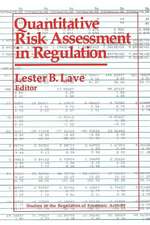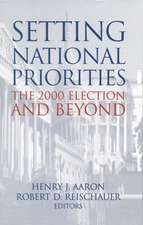Can We Say No?: The Challenge of Rationing Health Care
Autor Henry Aaron, William B. Schwartz Cu Melissa Coxen Limba Engleză Paperback – 21 noi 2005
Over the past four decades, the share of income devoted to health care nearly tripled. If policy is unchanged, this trend is likely to continue. Should Americans decide to rein in the growth of health care spending, they will be forced to consider whether to ration care for the well-insured, a prospect that is odious and unthinkable to many. This book argues that sensible health care rationing can not only save money but improve general welfare and public health. It reviews the experience with health care rationing in Great Britain. The choices the British have made point up the nature of the options Americans will face if they wish to keep public health care budgets from driving taxes ever higher and private health care spending from crowding out increases in other forms of worker compensation and consumption. This book explains why serious consideration of health care rationing is inescapable. It also provides the information policymakers and concerned citizens need to think clearly about these difficult issues and engage in an informed debate.
Preț: 186.11 lei
Preț vechi: 195.91 lei
-5% Nou
Puncte Express: 279
Preț estimativ în valută:
35.64€ • 36.72$ • 29.86£
35.64€ • 36.72$ • 29.86£
Carte tipărită la comandă
Livrare economică 24 februarie-10 martie
Preluare comenzi: 021 569.72.76
Specificații
ISBN-13: 9780815701217
ISBN-10: 0815701217
Pagini: 199
Ilustrații: black & white illustrations
Dimensiuni: 152 x 229 x 14 mm
Greutate: 0.3 kg
Editura: Brookings Institution Press
Colecția Brookings Institution Press
ISBN-10: 0815701217
Pagini: 199
Ilustrații: black & white illustrations
Dimensiuni: 152 x 229 x 14 mm
Greutate: 0.3 kg
Editura: Brookings Institution Press
Colecția Brookings Institution Press
Notă biografică
By Henry Aaron; William B. Schwartz and Melissa Cox
Descriere
Over the past four decades, the share of income devoted to health care nearly tripled. If policy is unchanged, this trend is likely to continue. Should Americans decide to rein in the growth of health care spending, they will be forced to consider whether to ration care for the well-insured, a prospect that is odious and unthinkable to many. This book argues that sensible health care rationing can not only save money but improve general welfare and public health. It reviews the experience with health care rationing in Great Britain. The choices the British have made point up the nature of the options Americans will face if they wish to keep public health care budgets from driving taxes ever higher and private health care spending from crowding out increases in other forms of worker compensation and consumption. This book explains why serious consideration of health care rationing is inescapable. It also provides the information policymakers and concerned citizens need to think clearly about these difficult issues and engage in an informed debate.
